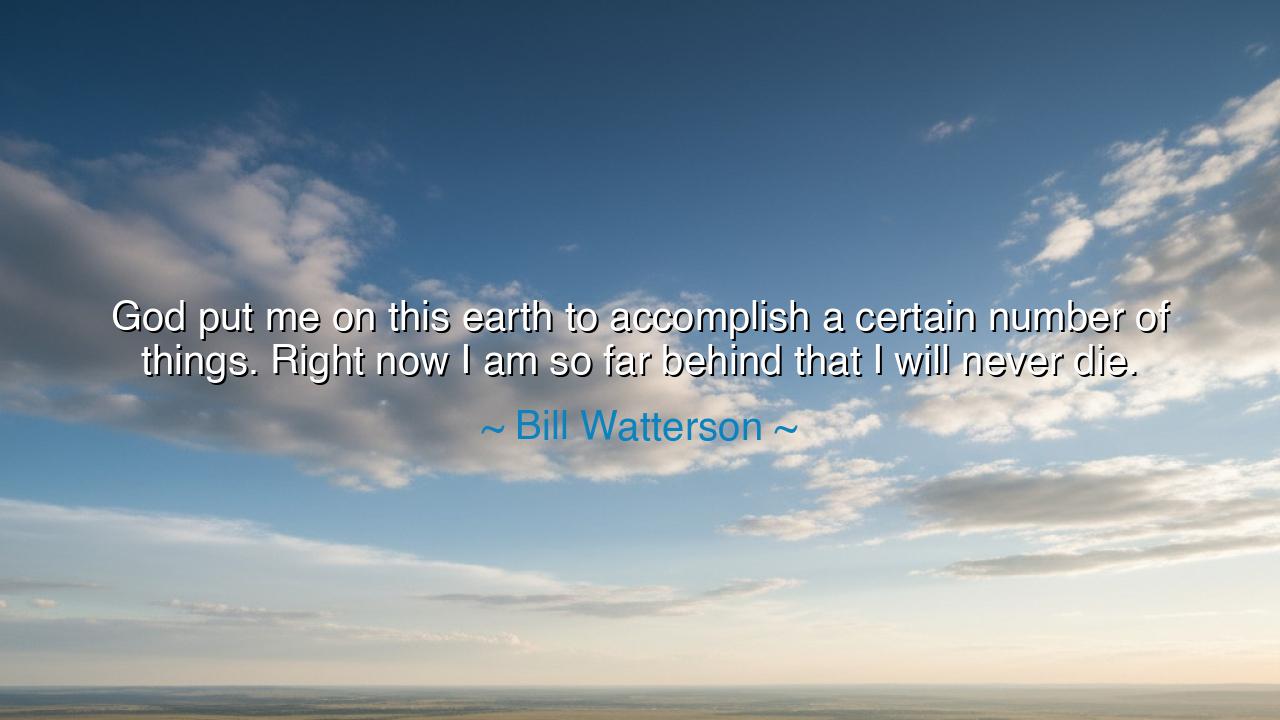
God put me on this earth to accomplish a certain number of
God put me on this earth to accomplish a certain number of things. Right now I am so far behind that I will never die.






“God put me on this earth to accomplish a certain number of things. Right now I am so far behind that I will never die.” — so spoke Bill Watterson, the creator of Calvin and Hobbes, a man who saw both the humor and holiness in the struggle of human striving. His words, playful on the surface, conceal a deep wisdom — the ancient truth that life’s purpose is not to finish but to continue. In this jest lies a profound reflection on purpose, imperfection, and the sacred art of living. For what he calls being “behind” is, in truth, the eternal condition of the soul: always reaching, always learning, always unfinished, yet always alive.
In the tone of jest, Watterson speaks like a philosopher disguised as a fool — one who laughs at mortality while reminding us that the meaning of life lies not in completion, but in continuation. To be “behind” in our tasks, to be forever chasing after the horizon, is not failure but vitality. For as long as the heart has a task, the spirit has a reason to rise each morning. The ones who feel “done” are those who begin to fade. But those who still burn with unfulfilled dreams — they are the ones who live longest in the fire of creation.
This quote emerges from the spirit of Watterson’s art, a world where a boy and his tiger wrestle with the infinite. Through Calvin and Hobbes, he explored the balance between childlike wonder and adult weariness, between laughter and longing. His humor was never merely a joke — it was a prayer dressed in playfulness. When he says he is so far behind he will never die, he reminds us that our unfinished work — our unpainted canvas, unwritten story, unsolved mystery — is what keeps the divine spark alive within us. To live fully is to be eternally incomplete, to chase after the infinite without demanding to grasp it.
Consider the life of Leonardo da Vinci, that restless spirit who never stopped reaching beyond the possible. His notebooks overflowed with sketches, inventions, and visions left undone. His works, magnificent though they were, were only fragments of what his mind conceived. To his dying breath, Leonardo mourned that he had “offended God and mankind by not working at his art as he should have.” Yet the world knows the truth: it was his very unfinishedness that made him immortal. He was always behind because his dreams ran faster than time itself — and so his legacy never died.
This is the paradox that Watterson touches with laughter: that the very sense of being incomplete is the proof of being alive. To live is to remain in motion — to dream beyond one’s reach, to love without finishing, to strive toward the unreachable. Perfection is not the goal of human life; growth is. And when we measure our worth not by what we have achieved, but by how deeply we keep striving, we understand that being “behind” in life’s grand tasks is no shame — it is the very rhythm of existence.
Yet this quote also carries a mirror for the weary soul — a gentle warning against despair. Many look upon their unfinished goals and see only failure. But what if these delays, these endless labors, are not punishments but promises? What if the divine intent was never for us to complete everything, but to be continually shaped by the act of doing? For in the pursuit, we are refined; in the struggle, we are sanctified. The one who works with love and patience, even knowing he may never finish, has already fulfilled his purpose.
So, take this lesson to heart: do not curse your unfinished labors, nor despair at how far you are from the end. The universe is vast, and your work — whether humble or grand — is a conversation with eternity. Let your toil be sacred, your imperfection be your teacher, and your persistence be your offering. Each task you leave undone is a testament to your humanity, a sign that you were alive and striving still.
For in truth, Watterson’s words are a hymn to the eternal worker — the soul who will never “catch up” because creation itself never ends. The world needs not the one who finishes, but the one who keeps beginning. So laugh, as he did. Labor joyfully. Be “behind” forever. For as long as you have something left to do, something left to dream, something left to give — you will never die.






AAdministratorAdministrator
Welcome, honored guests. Please leave a comment, we will respond soon